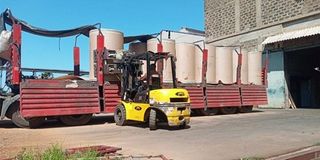Revived Pan Paper breathes fresh life into Webuye town

A forklift loads reels of papers onto a truck outside Pan Africa Paper Mills stores in Webuye on September 3, 2021.
What you need to know:
- The factory’s journey to its glorious days has been fraught with many challenges, particularly the ban on logging.
- The factory's revival has come as good for hundreds of former employees who lost their jobs more than a decade ago.
To an onlooker, the rusty chimney and corroded metallic equipment at Pan African Paper Mills situated along Webuye-Eldoret highway paints a picture of a dilapidated factory.
However, the situation is quite different. The factory’s run down exterior doesn’t give the slightest hint of what has been going on inside the factory for the last four years.
In 2009, when Pan African Paper Mills collapsed the economy of Webuye town was dealt a heavy blow. Hundreds of employees were rendered jobless and Webuye almost turned into a ghost town.
Many residents of the town, including small-scale traders, relocated to other towns. Market centres like T Junction, Sango, Generation, Wananchi, Lions and Dinaa became deserted overnight.
Learning institutions, which were situated near the mills, also suffered a major setback due to dropped leaner population as jobless parents with their school going children moved to upcountry.
Thankfully, the factory’s gradual revival is slowly attracting the erstwhile stalled economic activities back to the town.
But revival process has been a smooth journey for the company. In 2018, just when Pan African Paper Mill was about to start milling, the government imposed a ban on logging in both public and community forests.
The government’s directive did not stop Rai Group, though, from continuing with its plans to turn around the fortunes of the once hugely profitable company.
Prior to this, in 2016, the new management injected about Sh1 billion to the factory and settled on locally sourced recycled waste papers as alternative raw material for the manufacture of papers.
It is now three years since the factory resumed its operations. The factory had been inoperational between 2009 and 2016.
According to the company’s General Manager, Palanapian Psubramaniam, the factory’s journey to its glorious days has been fraught with many challenges, particularly the ban on logging.
Initially, the factory relied on logs of trees to make papers. Being a chemical processing industry, Mr Psubramaniam said most of the equipment had corroded beyond repair at the time the new investor came on board, thereby increasing the cost of investment required to restart the plant.
Mr Psubramaniam said one machine is already fully operational while a second one is awaiting official commissioning at the end of this month.
However, he did not reveal how much has been pumped into the factory, only stating that a substantial amount of money has been sunk into Pan Paper’s revival which is being carried out in phases.
“The journey has not been easy but we are happy that things have so far worked for us. We have made substantive investment in the factory and we are continuing to invest in it. We found most of the equipment in bad condition so that first thing we did was to replace them. That process is ongoing,” said Psubramaniam.
With the logging ban still on, Psubramaniam said they will continue using recycled waste paper as raw materials.
The factory, which had once been written off, is now a beehive activity and has employed at least 600 employees, a majority of whom are locals.
The factory has also put in place graduate trainee programme which absorbs fresh graduate to enable them gain the much-needed experience in the areas they studied in university.
Presently, the factory has the capacity to produce at least 18,000 tonnes of paper annually. Production is expected to go up once two more machines are operationalised before end of this year.

Reels of paper inside a store at Pan African Paper Mills stores in Webuye on September 3, 2021.
Meanwhile, the factory's revival has come as good for hundreds of former employees who lost their jobs more than a decade ago. Some 469 employees have been recalled by the current management.
Among them is Wellington Omido, who joined the company in 1978 as a trainee supervisor. At the time of the company’s collapse, he had risen to the position of deputy superintendent of stock preparation.
Omido recalls the devastating news of the company’s closure.
“People had nothing to hold on to. Some died because they had no other livelihood,” he recounted.
Like Omido, John Were has also been lucky enough to have been recalled, although in his case he was initially reluctant to accept the offer. But with hindsight, he says he is glad he accepted the offer.
“I have educated one of my children up to university with the salary I get every month,” he says.
Richard Omondi, another employee who returned to serve under the new management, also recalled his plight after the company went under.
Initially, he says, all the employees were asked to go home for three months with a promise from the management that they would receive 30 per cent of their salary over than period to keep them going. That was in January 2009.
But no payments were made by the company for seven years. This was until 2015 when they were recalled under the new management.
Now with things looking up, Rai Group is confident that they are on the right track and sooner rather than later, the paper milling factory will be fully operational.
“We are doing everything possible to make all machines operational. Decommissioning of corroded parts and asbestos is also going on smoothly. Residents should not expect heavy smokes and pungent smell like it was before because we are now using new technology,” said Psubramaniam.





